2020学年人教版高中英语必修三unit1-2单元知识点归纳
- 格式:doc
- 大小:60.50 KB
- 文档页数:6
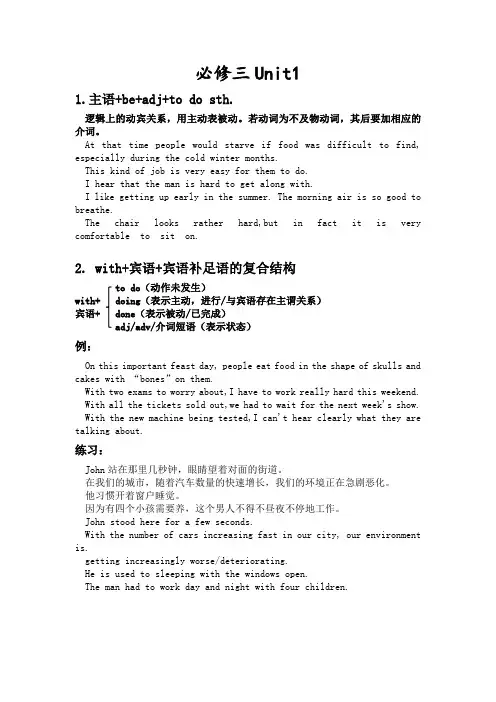
必修三Unit11.主语+be+adj+to do sth.逻辑上的动宾关系,用主动表被动。
若动词为不及物动词,其后要加相应的介词。
At that time people would starve if food was difficult to find, especially during the cold winter months.This kind of job is very easy for them to do.I hear that the man is hard to get along with.I like getting up early in the summer. The morning air is so good to breathe.The chair looks rather hard,but in fact it is very comfortable to sit on.2. with+宾语+宾语补足语的复合结构to do(动作未发生)with+ doing(表示主动,进行/与宾语存在主谓关系)宾语+ done(表示被动/已完成)adj/adv/介词短语(表示状态)例:On this important feast day, people eat food in the shape of skulls and cakes with “bones”on them.With two exams to worry about,I have to work really hard this weekend. With all the tickets sold out,we had to wait for the next week's show. With the new machine being tested,I can't hear clearly what they are talking about.练习:John站在那里几秒钟,眼睛望着对面的街道。

U1 重点词汇讲解Welcome to the unit1.Blind people can read by touching letters in raised dots called Braille.raised: adj. 凸起的raise: vt. raise your hand 举起手raise the price 提高价格raise money for the charity 为慈善机构筹钱raise a baby 养育小孩rise: vi. The sun rises in the east. 太阳从东边升起。
(rise, rose, risen)arise: vi. The problem arises from lack of communication. 这个问题产生于缺乏沟通。
(arise, arose, arisen)2.However, even if we have good senses, they can still confuse us.confuse: vt. sth. confuse sb. 某物使某人困惑confused: adj. sb. is confused about sth. 某人对于某物感到困惑。
his confused look/expression 他的困惑的表情confusing: adj. sth. is confusing. 某物令人困惑。
He was confused about the confusing news.他对这个令人困惑的消息感到困惑。
Reading1.As Polly observed the passengers on the train, she had a feeling that she was being watchedby a tall man in a dark overcoat.observe: vt.(1) 观察observe sth./sb.; observe thatThe teacher observed that some students were asleep. 老师发现一些学生睡着了。
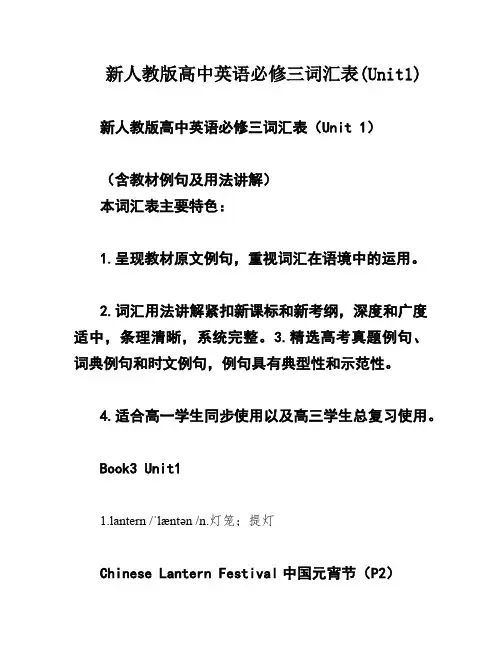
新人教版高中英语必修三词汇表(Unit1)新人教版高中英语必修三词汇表(Unit 1)(含教材例句及用法讲解)本词汇表主要特色:1.呈现教材原文例句,重视词汇在语境中的运用。
2.词汇用法讲解紧扣新课标和新考纲,深度和广度适中,条理清晰,系统完整。
3.精选高考真题例句、词典例句和时文例句,例句具有典型性和示范性。
4.适合高一学生同步使用以及高三学生总复习使用。
Book3 Unit1ntern /ˈlæntən /n.灯笼;提灯Chinese Lantern Festival中国元宵节(P2)People usually set off fireworks on the Lantern Festival.元宵节人们通常放烟花。
visit a lantern fair参观灯展(P2)2.carnival /' kɑ:nɪvl/n.狂欢节;嘉年华Rio Carnival里约狂欢节(P2)There is a local carnival every year.当地每年都举行狂欢节。
There are dragon dances and carnivals, and families celebrate the Lunar New Year together.舞龙灯、狂欢,全家人聚在一同欢庆阴积年。
3.costume /ˈkɒstju:m /n.(某地或历史时期的)服装;戏服wear traditional costumes穿传统服装(P2)costume party化装舞会A friend invited him to a costume party.一个朋友邀请他去参加一个化装舞会。
She has four costume changes during the play.她在这出戏里要换四次服装。
He went to the party in a monkey costume.他是打扮成一只猴子去加入集会的。

人教版高中英语必修三Unit1FestivalsandCelebrations重点知识归纳单选题1、The flowers _________ sweet attract the visitors to the beauty of nature, which _________ in the botanic garden last year.A.to smell; grewB.smell; were grownC.smelling; were grownD.smelt; were growing答案:C考查非谓语动词和动词时态语态。
句意:这些花闻起来很香,吸引了游客去欣赏大自然的美景,这些花是去年在植物园里种植的。
第一空,分析可知,此处为非谓语动词作后置定语,排除B项;smell“闻起来”是系动词,没有被动语态,不用过去分词smelt表达被动含义,排除D项;动词不定式 to smell 表将来,不符合句意,排除A项;所以应用现在分词短语 smelling sweet 作为 flowers 的定语;第二空,动词grow“种植”和主语之间是被动关系,根据时间状语last year,应使用一般过去时的被动语态 were grown。
故选C项。
2、________ the fog, we should have reached our school.A.Because ofB.In spite ofC.In case ofD.But for答案:D考查介词短语辨析。
句意:要不是大雾,我们本应该到了学校。
A.Because of由于,因为;B.In spite of 尽管;C.In case of以防,万一;D.But for 要不是,but for通常用于含蓄条件句中,相当于if条件句的用法,主句中使用虚拟语气。
根据后句“we should have reached our school(我们本应该到了学校)”可知,要不是大雾,我们本应该到了学校。
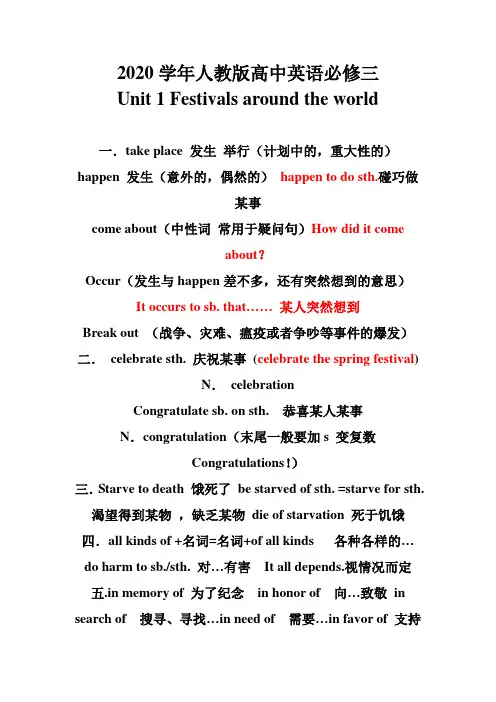
2020学年人教版高中英语必修三Unit 1 Festivals around the world一.take place 发生举行(计划中的,重大性的)happen 发生(意外的,偶然的)happen to do sth.碰巧做某事come about(中性词常用于疑问句)How did it comeabout?Occur(发生与happen差不多,还有突然想到的意思)It occurs to sb. that……某人突然想到Break out (战争、灾难、瘟疫或者争吵等事件的爆发)二.celebrate sth. 庆祝某事(celebrate the spring festival)N.celebrationCongratulate sb. on sth. 恭喜某人某事N.congratulation(末尾一般要加s 变复数Congratulations!)三.Starve to death 饿死了be starved of sth. =starve for sth.渴望得到某物,缺乏某物die of starvation 死于饥饿四.all kinds of +名词=名词+of all kinds 各种各样的…do harm to sb./sth. 对…有害It all depends.视情况而定五.in memory of 为了纪念in honor of 向…致敬in search of 搜寻、寻找…in need of 需要…in favor of 支持赞同in praise of 歌颂,赞扬六.in place of =instead of 代替…take the place of sb.=take one’s place 坐某人的位置,代替某人七.Dress up 盛装打扮be dressed in 穿着八.have(no)belief in (不)相信… have a strong belief in 坚信play a trick on sb.=play tricks on sb.九.gain independence from…脱离…而独立gain experience 获得经验No pains,no gains.一分耕耘一分收获十.award sb. sth.(接双宾语) =sb. be awarded sth.(被动更常考)admire sb. for sth. 因某事钦佩/羡慕某人respect sb. for sth 因某事尊敬某人forgive sb for(doing) sth. 原谅某人做某事forgive-forgave-forgivenapologize to sb. for (doing)sth.因做某事向某人道歉十一.look forward to(加名词或者动名词等形式)I’m looking forward to hearing from you.我期待着收到你的来信。
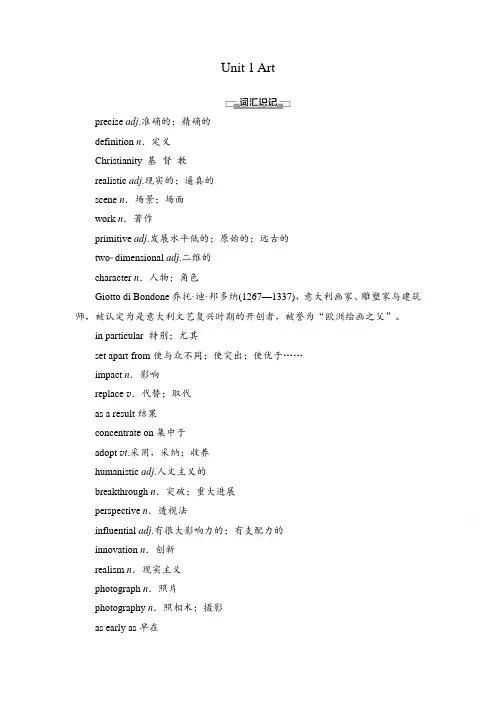
Unit 1 Artprecise adj.准确的;精确的definition n.定义Christianity 基督教realistic adj.现实的;逼真的scene n.场景;场面work n.著作primitive adj.发展水平低的;原始的;远古的twodimensional adj.二维的character n.人物;角色Giotto di Bondone乔托·迪·邦多纳(1267—1337),意大利画家、雕塑家与建筑师,被认定为是意大利文艺复兴时期的开创者,被誉为“欧洲绘画之父”。
in particular 特别;尤其set apart from使与众不同;使突出;使优于……impact n.影响replace v.代替;取代as a result结果concentrate on集中于adopt v t.采用,采纳;收养humanistic adj.人文主义的breakthrough n.突破;重大进展perspective n.透视法influential adj.有很大影响力的;有支配力的innovation n.创新realism n.现实主义photograph n.照片photography n.照相术;摄影as early as早在height n.高;高度reputation n.名誉;名声shadow n.影;阴影emphasis n.重点shift v t.转移;挪动noble n.贵族成员;出身高贵的人purchase v t.购买;采购accurate adj.精确的;准确的historical adj.历史的mythology n.神话;虚幻的想法client n.委托人;当事人;客户no longer不再preserve v.保存;保留emerge v i.&v t.出现;浮现;暴露convey v t.表达;传递;传送subjective adj.主观的detailed adj.详细的;详尽的focus on注意;集中于;聚焦于black-and-white photograph 黑白照片seek v.寻找;寻求outer adj.外边的;外围的subsequent adj.随后的;后来的;之后的analyse v.分析exist v.存在Cubism n.立体主义quality n.质量;品质1.real adj. 真实的;实际存在的;非凭空想象的;真的→reality n. 事实→realist n. 现实主义画家(或作家等);现实主义者→realism n.逼真;现实主义;务实作风→realistic adj. 现实的;逼真的2.human n.人→humanity n.人性;人道;(统称)人类→humanistic adj.人文主义的3.influence n.影响v.影响→influential adj.有很大影响力的;有支配力的4.emerge v i.&v t.出现;浮现;暴露→emergence n.出现;兴起5.sculpt v. 雕刻;雕塑;使具有某种形状→sculptor n. 雕刻家;雕塑家→sculpture n. 雕像;雕刻品;雕刻术rank n.(尤指较高的)地位;级别;军衔;行列v. 把……分等级;排列;使排成行①She was not used to mixing with people of high social rank. 级别②He was soon promoted to the rank of captain. 军衔③The tasks have been ranked in order of difficulty. 分等级④The report ranks the UK 20th out of 22 advanced nations. 排列Words and Phrases1[教材原句P2]In particular,his paintings are set apart from other paintings by their realistic human faces and deep emotional impact.尤其是他的绘画作品,更是以其逼真的人物面貌和深刻的情感冲击而从其他绘画作品中脱颖而出。
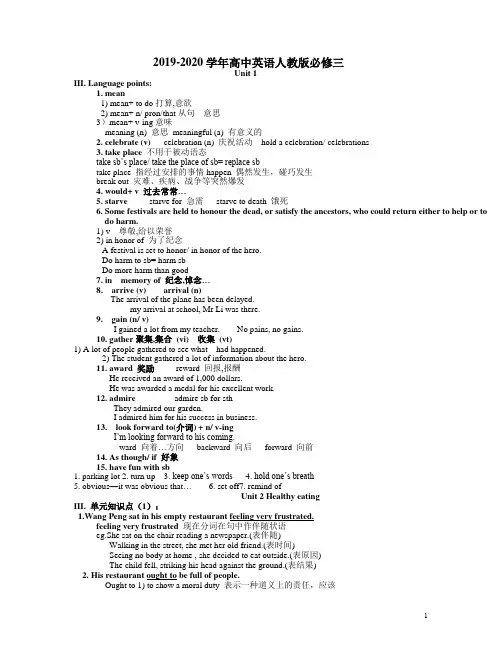
2019-2020学年高中英语人教版必修三Unit 1III. Language points:1. mean1) mean+ to do打算,意欲2) mean+ n/ pron/that从句---意思3)mean+ v-ing意味meaning (n) 意思meaningful (a) 有意义的2. celebrate (v) celebration (n) 庆祝活动hold a celebration/ celebrations3. take place 不用于被动语态take sb’s place/ take the place of sb= replace sbtake place 指经过安排的事情happen 偶然发生,碰巧发生break out 灾难、疾病、战争等突然爆发4. would+ v 过去常常…5. starve starve for 急需starve to death 饿死6. Some festivals are held to honour the dead, or satisfy the ancestors, who could return either to help or todo harm.1) v 尊敬,给以荣誉2) in honor of 为了纪念A festival is set to honor/ in honor of the hero.Do harm to sb= harm sbDo more harm than good7. in memory of 纪念,悼念…8. arrive (v) arrival (n)The arrival of the plane has been delayed.____ my arrival at school, Mr Li was there.9. gain (n/ v)I gained a lot from my teacher. No pains, no gains.10. gather聚集,集合(vi) 收集(vt)1) A lot of people gathered to see what had happened.2) The student gathered a lot of information about the hero.11. award 奖励reward 回报,报酬He received an award of 1,000 dollars.He was awarded a medal for his excellent work.12. admire admire sb for sthThey admired our garden.I admired him for his success in business.13. look forward to(介词) + n/ v-ingI’m looking forward to his coming.--ward 向着…方向backward 向后forward 向前14. As though/ if 好象15. have fun with sb1. parking lot2. turn up3. keep one’s words4. hold one’s breath5. obvious—it was obvious that…6. set off7. remind ofUnit 2 Healthy eatingIII. 单元知识点(1):1.Wang Peng sat in his empty restaurant feeling very frustrated.feeling very frustrated现在分词在句中作伴随状语eg.She sat on the chair reading a newspaper.(表伴随)Walking in the street, she met her old friend.(表时间)Seeing no body at home , she decided to eat outside.(表原因)The child fell, striking his head against the ground.(表结果)2. His restaurant ought to be full of people.Ought to 1) to show a moral duty 表示一种道义上的责任,应该Eg.She ought to look after her child better.You ought to study hard to get a high mark.2)ought to have done 表示本应该…,而却没有…Eg.You ought to have come yesterday.3.He thought of his mutton kebabs, fatty pork cooked in the hottest, finest oil. 过去分词短语作后置定语,表被动。
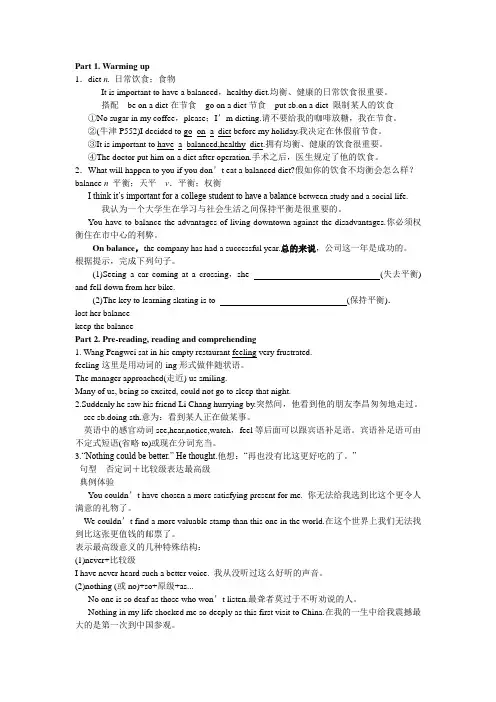
Part 1. Warming up1.diet n.日常饮食;食物It is important to have a balanced,healthy diet.均衡、健康的日常饮食很重要。
搭配be on a diet在节食go on a diet节食put sb.on a diet 限制某人的饮食①No sugar in my coffee,please;I’m dieting.请不要给我的咖啡放糖,我在节食。
②(牛津P552)I decided to go_on_a_diet before my holiday.我决定在休假前节食。
③It is important to have_a_balanced,healthy_diet.拥有均衡、健康的饮食很重要。
④The doctor put him on a diet after operation.手术之后,医生规定了他的饮食。
2.What will happen to you if you don’t eat a balanced diet?假如你的饮食不均衡会怎么样?balance n平衡;天平v.平衡;权衡I think it’s important for a college student to have a balance between study and a social life.我认为一个大学生在学习与社会生活之间保持平衡是很重要的。
You have to balance the advantages of living downtown against the disadvantages.你必须权衡住在市中心的利弊。
On balance,the company has had a successful year.总的来说,公司这一年是成功的。
根据提示,完成下列句子。
(1)Seeing a car coming at a crossing,she (失去平衡) and fell down from her bike.(2)The key to learning skating is to (保持平衡).lost her balancekeep the balancePart 2. Pre-reading, reading and comprehending1. Wang Pengwei sat in his empty restaurant feeling very frustrated.feeling这里是用动词的-ing形式做伴随状语。

Unit 1单词、短语、重点句型梳理重点单词arrival【课文原句】In the USA, Columbus Day is in memory of the arrival of Christopher Columbus in the New World. (Page 2)【点拨】arrival n. 意为"到来;到达"。
如:Mary’s sudden arrival brought us a big surprise.【拓展】★arrival所构成的常用搭配有:on /upon arrival一到达就……;thearrival of……的到来;early / late /new arrival早到/晚到/新来的人。
如:Guests will receive dinner on / upon arrival at the hotel.The arrival of winter can make many people upset.New arrivals were greeted with a warm welcome.★名词arrival是由动词arrive加后缀"-al"构成的。
"-al"在此作名词后缀。
像这样构成的名词还有:refusal (= refuse +后缀"-al") 拒绝;survival (= survive +后缀"-al") 幸存。
【小试牛刀】根据中文提示,用arrival所构成搭配的适当形式完成下列句子。
1. 来晚的人不允许进入剧院。
____________ will not be admitted to the theatre.2. 在这张表格上,你可以标明你希望在你到达的时候有助教去接你。
On the form you may mark that you want a tutor to pick you up __________.3. 自从手机问世以来,电话号码的需求量正在迅速增长。
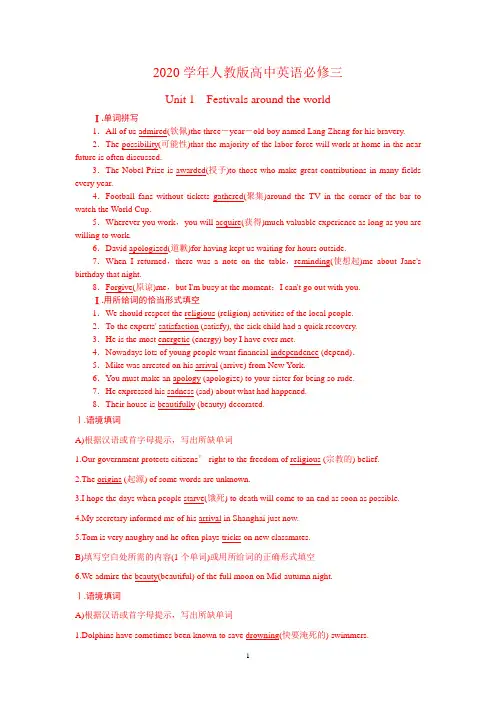
2020学年人教版高中英语必修三Unit 1Festivals around the worldⅠ.单词拼写1.All of us admired(钦佩)the three-year-old boy named Lang Zheng for his bravery.2.The possibility(可能性)that the majority of the labor force will work at home in the near future is often discussed.3.The Nobel Prize is awarded(授予)to those who make great contributions in many fields every year.4.Football fans without tickets gathered(聚集)around the TV in the corner of the bar to watch the World Cup.5.Wherever you work,you will acquire(获得)much valuable experience as long as you are willing to work.6.David apologized(道歉)for having kept us waiting for hours outside.7.When I returned,there was a note on the table,reminding(使想起)me about Jane's birthday that night.8.Forgive(原谅)me,but I'm busy at the moment;I can't go out with you.Ⅰ.用所给词的恰当形式填空1.We should respect the religious (religion) activities of the local people.2.To the experts' satisfaction (satisfy), the sick child had a quick recovery.3.He is the most energetic (energy) boy I have ever met.4.Nowadays lots of young people want financial independence (depend).5.Mike was arrested on his arrival (arrive) from New York.6.You must make an apology (apologize) to your sister for being so rude.7.He expressed his sadness (sad) about what had happened.8.Their house is beautifully (beauty) decorated.Ⅰ.语境填词A)根据汉语或首字母提示,写出所缺单词1.Our government protects citizens’ right to the freedom of religious (宗教的) belief.2.The origins (起源) of some words are unknown.3.I hope the days when people starve(饿死) to death will come to an end as soon as possible.4.My secretary informed me of his arrival in Shanghai just now.5.Tom is very naughty and he often plays tricks on new classmates.B)填写空白处所需的内容(1个单词)或用所给词的正确形式填空6.We admire the beauty(beautiful) of the full moon on Mid-autumn night.Ⅰ.语境填词A)根据汉语或首字母提示,写出所缺单词1.Dolphins have sometimes been known to save drowning(快要淹死的) swimmers.2.I’ll never forgive(原谅) her for what she did.3.The teacher gave me permission to go home early.4.Jack apologized to Mary for not going to her party.5.The professor made a few notes to remind himself of what he wanted to say.B)填写空白处所需的内容(1个单词)或用所给词的正确形式填空6.He forgave me for losing(lose) his notebook.7.She’s so obviously(obvious) cleverer and prettier than I am.8.Memories and sadness(sad) came flooding over the 51-year-old man.Ⅱ.选词填空as though,get together,in memory of,day and night,look forward to11.The villagers set up a monument in memory of the heroes who died in the war.12.Your mother is looking forward to receiving your letter soon.13.The girl behaved as though she hadn’t known anything about the accident.14.The girls worked day and night to finish the task on time.15.A few of friends got together at my house on New Year’s Day.Unit 2Healthy eatingⅠ.单词拼写1.The boy lifted the stone with all his strength (力量).2.This restaurant was not giving its customers (顾客) energy-giving food.3.It is said that Japanese people like a dish made of raw (生的) fish.4.You shouldn't have had your son telling people lies (谎言) here and there.5.You should diet (节食)and take more exercise.6.The little boy would like to eat fried (油炸的) chicken.7.It is healthier to keep a balanced (平衡的) diet every day.8.Curiosity (好奇心) can make a scientist out of a child.9.The weakness (弱点) of the book is the author's inability to support his argument.10.I don't want any cake, I'm slimming (减肥).Ⅰ.单词拼写1.Mary has been on a_diet (节食) for weeks but still hasn't lost any weight.2.He pushed against that big stone with all his strength (力气).3.There is a time limit (限制):you must finish it in 30 minutes.4.The two men in the fight glared (怒目而视) at each other.5.You will benefit (受益) a lot from morning exercises.6.Don't be particular about food.A balanced (平衡) diet is very important for health.7.The letter was not addressed to me but I opened it out of curiosity (好奇).8.We aim to offer good value and service to all our customers (顾客).9.He thought that crying was a sign of weakness (软弱).10.I have consulted (查阅) a number of law books in the British Museums.Ⅰ.语境填词A)根据汉语或首字母提示,写出所缺单词1.He thought that crying is a sign of weakness(虚弱).2.His words are full of lies about the matter.3.It is healthier to keep a balanced diet every day.4.Curiosity is part of a child’s nature.5.I don’t want any cake,I’m slimming(减肥).B)填写空白处所需的内容(1个单词)或用所给词的正确形式填空6.They promised to make people energetic(energy) by using their products.7.He has no strength(strong) to stand up,for he is very weak.8.I find that it is hard to keep(keep) balance on the icy path.9.I went to the forest to do some research on wild animals.10.What will happen if you don’t eat a balanced diet?Ⅱ.选词填空ought to,get away with,tell a lie,lose weight,win...back11.He is working hard to win his reputation back.12.You’re too fat,and you’d better lose weight.13.How did he get away with cheating?14.The floors ought to be washed at least every two days.15.Judging from his expression,he told a lie just now.Ⅰ.语境填词A)根据汉语提示,写出所缺单词1.If you glare(怒目而视) at someone,you look at them with an angry expression on your face.2.We set a time limit(限定) of thirty minutes for the test.3.As students,we should combine(结合) book knowledge with practice.4.The new credit cards will be of great benefit(好处) to our customers.5.Consult(查阅) the dictionary when you come across any new words.B)填写空白处所需的内容(1个单词)或用所给词的正确形式填空6.It can be beneficial(benefit) to share your feelings with someone you trust.7.To read without reflecting is like eating without digesting(digest).8.There is a limit to one’s life,but no limit to serving the people.9.We needn’t have bought so much food now that Suzie won’t be with us for dinner.10.It was not long before he sensed the danger of the position.Ⅱ.选词填空earn one’s living,cut down,in debt,glare at,before long11.Before long,the noise dropped completely and the boat began to drift gently across the water.12.When life was difficult in the past,she earned her living by singing in a night club.13.They didn’t fight,but stood there glaring at one another.14.The couple who are in debt to their relatives have gone to another city.15.You ought to cut down on your intake of rich foods in order to keep healthy.Unit 3The Million Pound Bank NoteⅠ.单词拼写1.The sunrise is a beautiful scene (景象).2.I can make a bet(打赌) that our team will win.3.I warn you; I'm beginning to lose my patience (耐心)with you.4.In order to keep his money safe, he opened an account (账户) with the bank.5.The house has an underground passage (通道).6.It was quite a while before he spotted (认出)Mr. Smith in the crowd.7.Columbus discovered America by accident (偶然).8.With nothing to do, he just wanders (漫步)about every day.9.You may not collect money in the streets without a permit (允许).10.They had a lot of adventures (冒险)in the journey.Ⅰ.单词拼写1.Millions of people in Africa are still starving (挨饿) to death at present.2.I don't mind apologizing (道歉) to others if I make a mistake.3.She told me she had forgiven ( 原谅) him his rudeness.4.On my arrival (到达) at the hotel, he gave me a sweet kiss.5.It is important for us to have a balanced diet.6.As a parent, you ought to look after your children.7.He is very tall and can be easily spotted in the crowd.8.When a boy leaves college and begins to earn money he can live a life of independence.9.Her mother would not permit her to come back late.10.Some food like nut doesn't digest easily.Ⅰ.语境填词A)根据汉语提示,写出所缺单词1.The first scene (场景) of the play was almost over when they got to the theatre.2.The best thing that a manager can do in this situation is to help the employees seek (寻找) professional guidance.3.She spotted(发现) what was wrong with the air conditioner.4.The doctor will not permit(允许) him to walk until his leg has fully recovered.5.You needn’t feel sorry for what happened.After all,it wasn’t your fault (过错).B)填写空白处所需的内容(1个单词)或用所给词的正确形式填空6.Time permitting(permit),students can find a part-time job to decrease the burden of their family.7.They sought(seek) to punish him for his crime but he escaped.8.I was filled with envy at their adventurous(adventure) lifestyle.9.On no account should the house be left unlocked.10.I had just locked the door when I realized I had left my key in the room.Ⅱ.选词填空on the spot,account for,bring up,go ahead,to the contrary11.The child who is well brought up has been taught to be polite and to behave well.12.I will continue to believe it until I get proof to the contrary.13.He could not account for his absence from school.14.He was hit by a falling tree and killed on the spot.15.Go ahead and do what you like.Ⅰ.语境填词A)根据汉语提示,写出所缺单词1.It’s good manners(礼仪) to say “thank you” when you get something from others.2.My little brother likes to eat dessert(餐后甜点) very much after dinner,especially ice cream.3.The amount(数量) of snow this year in the northern area has been below average.4.In some countries,people bow(鞠躬) to each other when they say hello.5.The fans screamed(尖叫) with excitement when they saw the famous singer.B)填写空白处所需的内容(1个单词)或用所给词的正确形式填空6.You’ll answer for your rudeness(rude) one day.7.Seats,or sometimes entire tables,were reserved(reserve).rge amounts of money were spent on the bridge.9.As for/to the cost,it will be very little.10.He feels it his duty that he should serve the people heart and soul.Ⅱ.选词填空take a chance,as for,a large amount of,on the spot,in a rude manner11.The reporter is on the spot where the two trucks hit each other.12.As for the child,we should find a family to bring him up.13.The waiter asked Henry in a rude manner what there was to wait for.14.We will take a chance on the weather and have the party outside.15.I had to spend a large amount of money to get it back in a month.Unit 4Astronomy: the science of the starsⅠ.单词拼写1.Too much sugar can be harmful to children's health.2.Six multiplied (乘) by five is thirty.3.A truck went out of control and crashed(撞到)into the back of a bus.4.What he said puzzled (困惑)most of us.5.The professor has brought in a good system(系统)of teaching language from abroad.6.Unlike (不像)most people in the office who come to work by car, I usually come to work by bus.7.My new teacher is a very gentle(文雅的) person and is kind to us.8.There is an atmosphere(气氛)of peace and calm in the country.9.The robbers hit the door of the bank violently(暴力的).10.Do you believe in the existence (存在)of ghosts?Ⅰ.用所给词的适当形式填空1.Unlike (like) most people in the office who come to work by car,I usually come to work by bus.2.If vocabulary is the “building materials” for language,sentences are the “fundamental (fundament) parts” of writings.3.I consider that it is harmful (harm) for students to play computer games,though some of them don't think so.4.It's surprising that a three-year-old boy knows that four multiplied (multiply) by four is sixteen.5.There was a puzzled (puzzle) look on her face because a puzzling (puzzle) problem puzzled (puzzle) the little girl.6.The ship rocked violently (violent) from side to side,causing many passengers to feelseasick.Ⅰ.语境填词A)根据汉语或首字母提示,写出所缺单词1.The expert wants to find out why this sand is unlike(不同) the sand on the other side of the island.puter hackers have broken down security systems(系统),raising questions about the safety of information.3.I was puzzled(困惑的) how to handle the situation.4.Multiplying very fast,rabbits soon became the largest family of all the animals in this woods.5.Air pollution will get worse and this will be harmful to people. For example,it can cause cancer.B)填写空白处所需的内容(1个单词)或用所给词的正确形式填空6.The thief attached me violently(violent) and I was knocked down before I could ask for help.7.It is unlikely(like) that we shall find a cafe there,so let’s bring sandwiches.8.After Yang Liwei succeeded in circling the earth,what our astronauts desire to do is walk in space.9.The development of a planet generally depends on atoms combining together.10.I heard such encouraging news that I couldn’t sleep well that night.Ⅱ.选词填空be fundamental to,cool down,lay eggs,in time,in one’s turn11.The warm weather here permits the birds to lay eggs all year round.12.It took Charles a long time to cool down after the argument.13.Honesty is fundamental to human beings.14.We students clean the classroom every day in our turn.15.Work hard at your lessons,and you are sure to make progress in time.Ⅰ.语境填词A)根据汉语提示,写出所缺单词1.I was terrified that the plane would crash(坠落).2.The smell of new bread floated(飘动) up from the kitchen.3.Don’t pull(拉) so hard or the handle will go off.4.As we all know,Qian Xuesen is a famous physicist(物理学家).5.The young man knows little about Newton’s law of gravity(万有引力).B)填写空白处所需的内容(1个单词)或用所给词的正确形式填空6.The boy was punished in the presence(present) of all his classmates.7.The mountain gorilla is on the verge(边缘) of extinction(extinct).8.When we saw the road blocked(block) with snow,we decided to spend the holiday at home.9.Teaching is as much an art as it is a science.10.Now that the baby can hear,some moms like to read books or play music.Ⅱ.选词填空watch out for,break out,cheer up,as if,get the hang of11.Have you got the hang of what the teacher explained?12.Cheer up! We nearly reached the top of the hill.13.Watch out for the stairs—they’re steep.14.A big fire broke out on August 12th,2015 in Tianjin Port.15.He talked as if he were a professor of the university.Unit 5Canada—“ The True North”Ⅰ.单词拼写1.She enjoys chatting (聊天)with grandma over the phone.2.Animals in a zoo are not living in their natural surroundings (环境).3.He went to Australia in the 1980s and settled down there.4.The composer is also a gifted (天赋) pianist.5.There are seven continents in the world, of which Asia is the largest.6.We must take necessary measures (采取措施) to solve these problems one by one.7.When she came to China, she brought some luggage (行李)with her.8.As we all know, the scenery (风景)is famous in the world.9.He tried to flee across the border(边境)but was caught.10.Though he was hurt slightly (轻微地), he still lay on the bed all the day.Ⅰ.用所给词的适当形式填空1.They found that the surrounding (surround) environment was worse and worse.2.If mixed (mix) up, they are poisonous .3.People look forward to chatting (chat)with the ones they loved.4.If you want to make a dress,first you'll take your measure (measure).5.The composer is also a gifted (gift) pianist.6.He settled down to doing (do) his work.7.It is Tom,rather than you,that is (be) to blame.Ⅰ.语境填词A)根据汉语提示,写出所缺单词1.When I got home,I found my son was playing on the carpet,surrounded(包围) by all kinds of toys.2.At present the local government is taking measures(措施) to reduce the pollution.3.The scenery(风景) of the West Lake is beautiful beyond description.4.The plane is leaving in half an hour,so we’d better go aboard(上飞机) now.5.Don’t leave matches or cigarettes on the table within(在……之内) the reach of little children.B)填写空白处所需的内容(1个单词)或用所给词的正确形式填空6.I would rather you had told(tell) me the truth yesterday.7.Don’t worry!Your son is only slightly(slight) injured.8.My father has a gift for playing the piano,which has a great influence on me.9.I had planned to help you,but it was not within my power.10.Go eastward,and you will see a beautiful lake.Ⅱ.选词填空have a chat with,settle down,go through,catch sight of,be on a trip11.Before she settled down in Portugal,she had run her own shop in London.12.I caught sight of her getting on the bus when I came out of the bookstore.13.It is good for you to have a chat with your friends sometimes.14.They were on a trip to Xi’an when I called them up.15.They first went through a valley,then a forest and at last to the village.Ⅰ.语境填词A)根据汉语提示,写出所缺单词1.They had decided to leave at dawn(黎明).2.Please bring something with you that confirms(证明) your identity.3.What impressed(给……印象) us most about the book was its beautiful language.4.We were very pleased(高兴的) to hear this encouraging news.5.There has been a great distance(隔阂) between us since our quarrel.B)填写空白处所需的内容(1个单词)或用所给词的正确形式填空6.As for me,I prefer traditional(tradition) shopping although it takes more time than shopping online.7.It is obvious that this is a mixture(mix) of egg and orange.8.There’s a tradition in our office that when it’s somebody’s birthday,they bring in a cake for us all to share.9.We are going on a tour to Japan to visit the modern factory.10.It’s an either-or situation—we can buy a new car this year or we can go on holiday but wecan’t do both.Ⅱ.选词填空go downtown,be impressed by,be pleased with,in the distance,rather than11.He could see the tall chimneys of the factory in the distance.12.We will have the meeting in the classroom rather than in the great hall.13.How much does it cost to go downtown by taxi?14.The girl was impressed by the kindness and patience of the guide.15.The teacher was pleased with what the boy had done and smiled.Unit 1 , Book 4Ⅰ、单词拼写1.Animals in a zoo are not living in their natural ________(环境).2.Mary has a blue dress with a white ________(边沿).3.My son has ________(定居)happily in China.4.We were travelling ________(向东).5.He learned to speak English ________ (在……之内)six months.6.We must take necessary ________(措施) to solve these problems one by one. 7.When she came to China, she brought some ________(行李)with her. 8.As we all know, the ________(风景)is famous in the world.9.The boy is ________(闲谈)on the Internet with some strangers. 10.Though he was hurt ________(轻微地), he still lay on the bed all the day.【答案】1.surroundings 2.border 3.settled 4.eastward(s) 5.within 6.measures 7.baggage 8.scenery9.chatting10.slightly用所给词的适当形式填空1.These ________(tradition) clothes still look attractive.2.He accumulated his ________(wealthy) by working hard for years.3.The old man lives alone in the ________(distance) little village.4.In ________(mist) weather,drivers should drive very carefully.5.Four weeks are often ________(approximate) regarded as one month.6.The river grows ________(broad) and ________(broad) as it nears the sea.7.The whole village is against the suggestion that they build an airport ________(near).8.The little child was ________(terrify) of crossing such a busy street.9.He was ________(please) with their warm welcome.10.We were ________(impress) with your wonderful performance at the party.【答案】1.traditional 2.wealth 3.distant 4.misty 5.approximately 6.broader;broader 7.nearby8.terrified 9.pleased10.impressed用所给词的适当形式填空1.He had ____________ (achieve)everything he wanted.2.I have an ____________ (argue)with her on such a dangerous journey.3.It was her kindness and the ______________ (consider)she showed to all her patients that had made her famous.4.This textbook is ____________ (intend)for junior middle school students.5.Mrs.Jones was ____________ (deliver)of twins last night.6.Sweet memories came ________ (crowd)in on her.【答案】 1.achieved 2.argument 3.consideration 4.intended .delivered 6.crowding第二节书面表达(满分25分)假如你叫李华,你和你的家人去笔友David所在的城市新加坡旅游,受到David的热情款待,回来后你想对他表达自己的感谢之情。
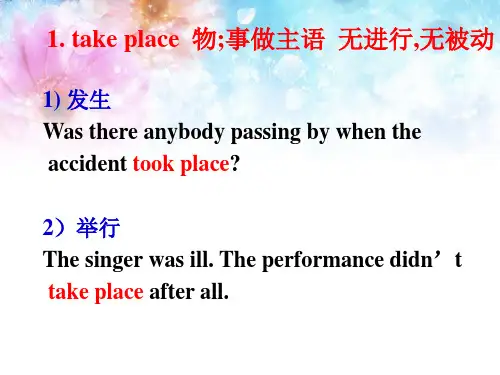
2020学年人教版高中英语必修三Unit 1 Festivals around the word二、重点单词突破1 satisfy v.使满意,使满足;满足(需求、需要等)[应试指导]写作高分句式:What satisfied sb.is that...替换to one’s satisfaction他对赢得比赛感到满意。
[夯实基础](1)用satisfy的适当形式填空①None of these is particularly satisfying.②We are not satisfied with these results.③Both sides expressed satisfaction with the progress so far.④We just can’t find enough good second-hand cars to satisfy demands.⑤From his satisfied voice on the phone I know everything is going under way.(2)The teacher was satisfied with his test results and praised him.Satisfied with his test results,the teacher praised him.(用过去分词作状语改写句子)2dress v.给……穿衣;穿着;打扮;n.衣裙;女装;衣服[应试指导]过去分词作定语、状语的考查休穿戴整洁地上班去了。
The boys were all dressed up as pirates.这些男孩子都装扮成了海盗。
[词义辨析]wear,have on,dress,put on(1)wear和have on表示“穿着”的状态,wear同时表示“佩戴”,并可以用于进行时,后还可以跟表示颜色的名词,而have on不行。
2020学年人教版高中英语必修三Unit 1 Festivals around the world1.mean doing sth. 意味着mean to do sth. 打算或企图做某事mean sb. to do sth. 打算让某人做某事be meant for 打算作…用2. take place 发生;举行take the place of sb= be in place of sb 替代某人3.of all kinds 各种各样的4..starve to death饿死be starved of sth. 缺乏starve for sth / starve to do 渴望5.be satisfied with感到满意to one’s satisfaction感到满意是...6. in memory of / in honor of . 纪念某人7.do harm to sb. =do sb. harm =be harmful to sb. 伤害某人8.in the shape of呈…的形状9.award sth.(to sb.) =award sb.sth.(for sth.) 给予, 颁奖reward sb. for sth. 因...奖赏某人10.reward sb. with sth. 用某物酬劳某人.dress up打扮,化装11.admire sb. for sth在某方面钦佩某人12.look forward to期望, 期待13.have fun with sb. 玩得开心, 过得快乐=have a good time = enjoy oneself.14.turn up.来, 出现; 把音量开大些15.keep one’s word 守信用16. break one’s word 失信17.set off 动身, 出发; 使(地雷、炸弹)爆炸18. remind sb. of sth. 提醒, 使想起remind sb to do sth 提醒某人做某事19. forgive sb (for) sth 原谅某人某事forgiving adj. 宽容的20.apologize to sb for (doing) sth = make an apology to sb for sth 因某事向某人道歉知识点归纳1. mean 的用法1). mean doing sth. “意味着(必须要做某事或导致种结果)”, 其主语通常是指事物的词。
2020学年人教版高中英语必修三Unit 1 Festivals around the world一、Sentences1.There’s no feast on earth that does not end in parting.2. A fall into the pit, a gain in your wit.3.It’s never too old to learn.4.Genius is nothing but labor and diligence.5.No cross no crown.二、Useful phrases1.self-respect 自尊self-discipline 自律2.discipline military discipline 军事训练Eg. Good discipline in the classroom makes iteasier to work.良好的课堂纪律有利于教学。
(n.)Offenders will be severely disciplined.违法者将受严惩。
(v.)3.work up to the collar 拼命工作collar 衣领white-collar worker白领blue-collar worker蓝领4.cannibal n. 怪兽,残食同类的动物或人5.missionary n. 传教士mission n. 使团,使命,传教地,职责6.Festivals the Double-Ninth Day 重阳节the Double-Seventh Day 七夕节the LanternDay 元宵节the Laba Rice Porridge Festival 腊八节Tomb-sweeping Day 清明节7.表达节日的日期可用fall 和be held 两种说法。
比如,Dragon boat Festival falls on the 5thDay of the 5th lunar month. 阴历五月初五The Double-seventh Day is held on the 7th day of the 7th lunar month.8.pick spring couplet 贴春联9.paste ‘up-sided Fu’贴倒过来的福10.sweep the dust 扫灰11.set off firecrackers放鞭炮12.give away lucky money in red paper 发压岁钱13.watch CCTV’s New Year’s Gala 看央视春晚14.eat prawn and dumplings 吃大虾和饺子15.reunion with family and relatives 和家人亲戚团聚16.mean to do sth. 意欲做某事mean doing sth. 意味着means 单复同形,方式Eg. Can I use your car? By all means=of course.By means of 通过…的方式Eg. They succeeded by means of hard working and perseverance.By no means 一点也不,绝不The first step will take quite a long time and can by no means by accomplished overnight.绝不She is by no means poor; in fact ,she’s very rich.一点也不17.accomplished adj. 完成了的,已经实现的,熟练地,有教养的Eg. An accomplished fact既成事实an accomplished musician 一位有造诣的音乐家an accomplished lady 一位有教养的女士18.starve starve to death 饿死starve for knowledge 渴求知识I’m starving.我快饿死了。
高一英语必修 3 unit1-3 知识点总结Unit11 take place以及place变型take place:发生take place 指有计划安排―发生‖ ―举行‖1.h appen 指没有计划安排―发生‖2.b reak out 指灾难、战争、疾病突然发生A war ____ ____ between the two countries in 1937. Broke outA car accident _____ yesterday happenedThe next Olympic Games will ___ ____in 2016 take place2. starve :饥饿starve to death 饿死starve for 渴望Many people starved ______ death in 1960s.A.toB. forC. ofD. with考点3 in + 名词+of.in memory of 纪念,追念in charge of 负责,掌管in search of 寻找in case of 万一in need of 需要考点4. play tricks on sb. 给某人开玩笑(恶作剧)他喜欢开别人玩笑He is fond of ____ tricks ____ othersA. playing , toB. play , onC. playing onD. to play, to7. award,prize,rewardaward 奖励,强调荣誉而不在乎奖品的大小或奖金的多少prize 指各类竞赛、竞争或抽奖中赢得的奖reward 指对某人的工作或服务等的报答(酬金,赏金)8. admire:钦佩,admire sb. for sth.9. look forward to 期待,期望(重点)写作+改错我希望能尽快收到你的来信。
I am looking forward to hear from you soon(x)I am looking forward to hearing from you soon.10. turn up (重点)○1出现=appearI waited for her, but she didn’t turn up.○2出席,参加= attendAbout 100 people turned up for the meeting.\wedding○3调大Turn up the radio/ the lightTurn down○1调小○2拒绝Turn on打开turn off 关闭turn out 结果是11. wordkeep one’s word 守信用Break one’s word 食言In a word 总之In other words 换句话说_____ a word, we should keep our _____. In other ____, we should never break our word. 总之,我们要遵守诺言。
新人教版高中英语必修三U1课文重点句汇集U11.Festivals are meant to celebrate important times of year. 节日就是庆祝一年中重要的日子。
(P1)2.Most ancient festivals would celebrate the end of the cold weather, planting in spring andharvest in autumn. 大多数古老的节日都是庆祝严寒的结束,春季的种植和秋天的收割。
3.At that time people would starve if food was difficult to find, especially during the coldwinter months. 在那个时代,如果食物难以找到,特别是在寒冷的冬天,人们会挨饿。
4.Some festivals are held to honour the dead or to satisfy the ancestors, who might return eitherto help or to do harm. 有些节日,是为了纪念死者,或使祖先得到满足,因为祖先们有可能回到世上(给人们)提供帮助,也有可能带来危害。
5.For the Japanese festival.Obon, people should go to clean graves and light incense in memoryof their ancestors. 在日本的梦兰盆节,人们要扫墓、烧香,以缅怀祖先。
6.On this important feast day, people eat food in the shape of skulls and cake s with ”bones” onthem. 在这个重要的节日里,人们会吃制成颅骨形状的食物,和装点有骨头的蛋糕。
2020学年人教版高中英语必修三知识点归纳Unit 1 Festivals around the world1. mean 的用法1). mean doing sth. “意味着(必须要做某事或导致种结果)”, 其主语通常是指事物的词。
2). mean to do sth. “打算或企图做某事”,主语通常是表示人的名词或代词,过去完成式表示“本来打算做某事”。
3). mean sb. to do sth. “打算让某人做某事”,也可以用于被动结构。
4). mean 后接名词、副词或从句, “表示;打算;存心”等意思;后接that 从句,意为“表示……”。
5). be meant for “打算给予;打算作……用”。
In some parts of London, missing a bus means _____ for another hour.A. waitingB. to waitC. waitD. to be waiting2. take place 发生;举行(不能用于被动语态中!)①The performance didn’t take place after all. 演出终于没有进行。
②Was there anybody passing by when the accident took place? 事故发生时,有人路过那里吗?与place相关短语:in the first place (用于列举理由)首先,第一点in the last place 最后in one’s place 处于某人的位置,为某人设身处地想一想in place 放在原来的位置,就位in place of 代替,用……而不用……take one’s place 找替某人接替某人的位置3. of all kinds 各种各样的相关归纳:all kinds of 各种各样的the same kind of 相同种类的different kinds of 不同种类的this/that kind of 这(那)种 a kind of 某种①That kind of question is very difficult to answer.= Questions of that kind are difficult to answer.②We sell all kinds of shoes.= We sell shoes of all kinds.③You can see different kinds of animals in the zoo.= You can see animals of different kinds in the zoo. 你在动物园可以看见不同种类的动物。
用动词的适当形式填空①Books of this kind ____ (sell) well in the bookstore.②This kind of books ____ (sell) well in the bookstore.4. starve v.挨饿; 饿死He said he would starve rather than beg for food. 他说他宁愿挨饿也不要饭吃。
5. plenty n.富裕days/years/...of plenty 富裕的日子/年月如:You have a life of plenty, what would you be worried about?plenty pron.大量; 充足plenty of可修饰可数名词和不可数名词, 用于陈述句。
如: You needn’t hurry. There is plenty of time left. 你不必慌忙, 剩下的时间很充足。
Taking plenty of exercise every day keeps you healthy. 每天多运动会使你身体健康。
6. 1) satisfy vt.满足,使…满意; satisfy sb. satisfied a.感到满意的; be satisfied withsatisfying a.令人愉快的satisfaction n.满意; to one’s satisfactionsatisfactorily ad.满意地satisfactory a. 令人满意的She bought a satisfactory computer—it’s cheap and of high quality.辨析satisfactory, satisfied, satisfyingsatisfactory 指客观的事物或主观的表现达到要求而令人满意, 主语一般用客体。
satisfied指主体对事物或表现感到满意, 主语是主体(人)如: She is satisfied with the service. 她对该项服务感到满意。
satisfying: giving pleasure令人愉快, 主语是不定式. 常用于句型: It’s satisfying to do s th. 做...使人满意如:It’s satisfying to learn the success of his son in job-hunting. 得知儿子找到工作,令他非常高兴。
hurt, injure, harm, damage, wound的区别与用法hurt 普通用语,既可指肉体上的伤害,也可精神上, 感情上的伤害。
如:The girl hurt herself badly in the accident.那位女孩在那次事故中伤得很重。
injure比hurt正式, hurt多指伤痛, 而injure则指损害健康, 成就, 容貌等, 强调功能的损失。
如:He injured his hand while playing basketball.他在打篮球时手受了伤。
damage主要指对于物的损害,强调对于价值、用途、外观等所造成的损失, 这种损失或因自然灾害所致, 或因人为造成。
如: Several cars were damaged in the accident. 好几辆汽车在事故中损坏了。
wound指枪伤, 刀伤, 刺伤等皮肉之伤, 是出血的, 严重的伤, 特指战场上受伤, 它可以指肉体上的伤害, 也可指人们精神上的创伤。
如: The bullet wounded his left leg. 子弹打伤了他的左腿。
7.origin n.起源;源头如:the origins of the life on earth 地球上生命的起源。
in memory of/ to the memory of sb. 纪念某人例句:The statue was built in memory of the famous scientist.8. dress作及物动词时, 不接clothes之类的表示衣服的名词, 而是接表示人的句词或代词, 意思是“给…穿衣服”。
当表示自己穿衣服时, 则用反身代词, 如:Wake up children and dress them. 唤醒孩子,给他们穿上衣服。
dress的过去分词常用来构成get dressed与be dressed短语, 前者表示动态, 后者表示静态, 穿何种衣服, 则用介词in. 如:Harry up and get dressed. 快点穿上衣服。
The girl was dressed in red. 这个女孩穿着一身红衣服。
dress up是“打扮,化装”,如: You should dress up when you take part in the party.She is ___ in red today and looks very beautiful.A.wearingB. having onC. dressingD. Dressed9. award. n.奖, 奖品v.判给, 授予award sb. sth. 奖赏某人某物辨析: award 和reward:award后接双宾语如: award sb. a metal 授予某人奖章reward 奖赏, 酬谢, 不能接双宾语。
reward sb. for sth. 因…奖赏某人reward sb. with sth. 用某物酬劳某人例句:She rewarded herself with a cup of coffee after a whole morning’s hard work.10.admire v.意为“赞赏;钦佩;羡慕;赞美;夸奖”注意: 表示“在某方面钦佩某人”用“admire sb. for sth.”例句:We all admire him for his courage and bravery. 我们都钦佩他的勇气和胆识。
11. look forward to (doing) sth. 意为期待着(做)某事, 其中的to是介词, 而不是动词不定式符号。
12. as though和as if没有什么区别。
as if用得普遍些, 却可引导方式状语从句和表语从句, 其从句谓语常用虚拟语气。
(1) 引导方式状语从句She acted as though nothing had happened.她装得好像什么事也没发生过似的。
当从句主语和主句主语一致,从句谓语中又含有动词to be时, 可以把主语和to be一起省去。
He looked about as though (he was) in search of something.他四处张望, 好像寻找什么。
(2) 引导表语从句It looks as if it’s going to rain看样子天要下雨as though和as if从句用虚拟语气, 还是用陈述语气,根据具体情况而定。
如果从句表示的意思与事实完全相反, 或者纯粹是一种假设, 通常用虚拟语气。
The child talks as if she were an adult. 那孩子说话的样子好像她是个大人。
13. have fun 过得快乐= have a good time, enjoy oneself. 短语有have fun ( in ) doing sth.14. But she didn’t turn up.1) 来, 出席(某活动) I’m very happy you turne d up so early.2) 把(收音机等)音量开大一些, 反义词turn down. 如Turn up the radio a little, I can scarcely hear the program. turn down 拒绝turn off 关掉turn on 打开turn out 结果是..... turn to sb. for help 向某人求助15. keep one’s word 守信用,反义词是break one’s word失信注意:keep one’s word和break one’s word中的名词word不能用复数形式!相关短语:in a word/in short/to be short 简言之;总之have a word with sb. 与某人谈话have words with sb. 与某人发生口角in other words 换句话说16. obvious adj.1) obvious+ to + 表示人的名词或代词如:Her disappointment was obvious to her friend.2) It + be + obvious +that-clause 显而易见,一目了然如:It was obvious that she was in danger.辨析:obvious/apparent/clearobvious 是三者中程度最强的,含有“一目了然” 之意。